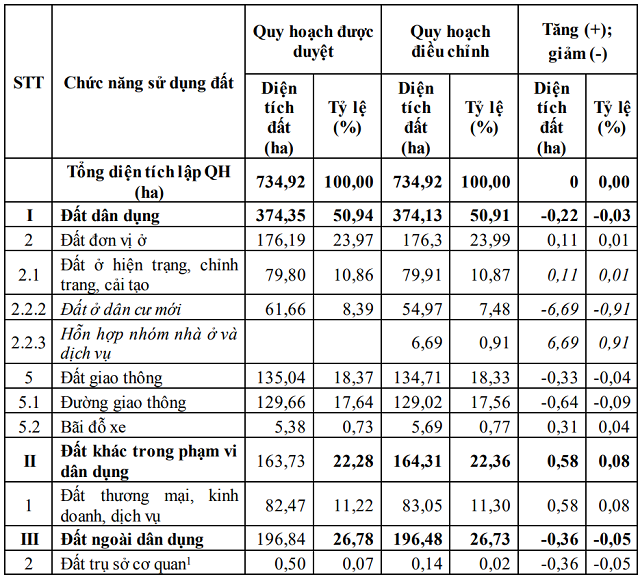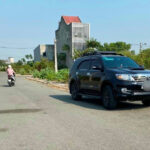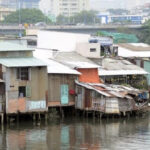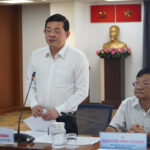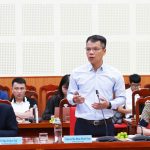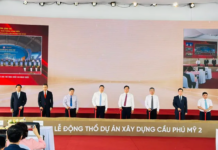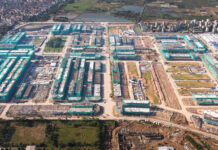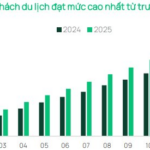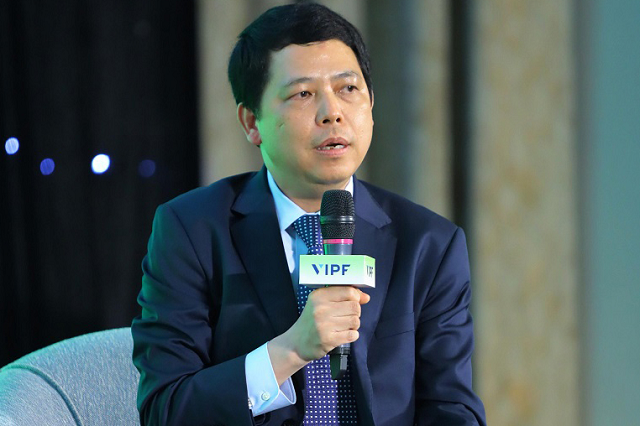In a decision dated August 29, a portion of the land area (approximately 2.43 ha) of the newly signed plots, DCM – Lot 28, 29, 30, 31, and 32, will be converted into mixed-use land for residential and commercial purposes. The building height limit will be increased from 3-5 stories to 15-20 stories, and 2-3 basement levels will be added to meet parking demands for both residents and visitors. Following these adjustments, the land-use coefficient will be recalculated.
Additionally, Thanh Nien Street (the 600-meter section from Truong Le Mountain to Le Hoan Street) will undergo a reduction in its road width from 34m to 21m by narrowing the sidewalks and dividing median while maintaining the existing roadway. Subsequently, the adjacent functional land plots will be adjusted to align with the new traffic cross-section.
Bui Thi Xuan Street, the 400-meter stretch from Thanh Nien Street to Ho Xuan Huong Street, will also see a decrease in its road width from 32m to 27m. The existing roadway will be preserved, while the sidewalks will remain untouched, and the dividing median will be narrowed.
Two roads within the coastal square urban area will be resized: Road No. 36 will be narrowed from 25m to 17.5m, and Road No. 39 will be reduced from 21m to 16m. Adjustments will be made to the adjacent land plots to ensure compliance with the new road dimensions.
|
Comparative table of planning adjustments
|
According to the provincial People’s Committee’s approval in 2020 of the 1/2000 subdivision planning of Area A – the central area for services, sea tourism, and urban areas in Sam Son City, the planning area covers 734.92 ha within the administrative boundaries of Truong Son, Bac Son, Trung Son, and Quang Cu wards. Specifically, Truong Son ward accounts for 31.22 ha, Bac Son ward for 51.33 ha, Trung Son ward for 94.47 ha, and Quang Cu ward for 557.9 ha.
The area is characterized as a center for tourism, services, commerce, and urban development in Sam Son, encompassing tourism services, entertainment, resorts, and river and sea-based tourism activities.
In terms of population, the current population is around 24,000 people, and it is projected to reach approximately 50,000 people by 2040.
The planned residential land includes existing residential areas subject to renovation and improvement (coded HTCT) with building heights ranging from 2 to 5 stories and a land-use coefficient of 1.2 to 4. Reallocation and new residential land (coded DCM-TĐC and DCM) will have building heights of 3 to 5 stories and a land-use coefficient of 1.8 to 4.5. New residential areas within the FLC eco-tourism and golf course project will feature building heights ranging from 2 to 10 stories and a land-use coefficient of 1.8 to 8.
The overall spatial structure and development orientation comprise the following: The area north of Hai Ba Trung Street, within the boundaries of Quang Cu Ward, will be dedicated to eco-tourism, resorts, entertainment, and the FLC Sam Son Golf Links and FLC Sam Son eco-tourism urban area projects. It will also include a community eco-park along the river, residential areas (both new and reallocated), schools, medical stations, cultural houses, commercial and service establishments (which may integrate residential, hotel, service, and resort functions), places of worship, and parking lots.
The space south of Hai Ba Trung Street to Le Thanh Tong Street, within the boundaries of Trung Son Ward, will feature a coastal square, commercial, business, and service establishments (which may incorporate residential, hotel, and various business service functions), reallocation residential areas, and places of worship.
The area south of Le Thanh Tong Street to the foot of Truong Le Mountain, within the boundaries of Bac Son and Truong Son wards, will accommodate commercial, business, and service establishments (which may include residential, hotel, and various business service functions), a medical center, a cultural, sports, and recreation center, a park, a research and training center, and educational institutions such as pre-university, university, and vocational schools.
The New Dynamics of Southern Land Subdivision Post-August 1st and the Enactment of the Three Laws
“There is a constant demand for real estate investments, especially from those with ready funds. This was shared by Binh, a Ho Chi Minh City land broker, who noted that there are still buyers in the market, especially for long-term investments, and that the new laws have not deterred serious buyers.”
Proposed Increase in Subsidies for Residents Living on Canals and Ditches in Ho Chi Minh City
As per this new proposal, only those with land use rights prior to July 1, 2014, will be eligible for a 70% subsidy on residential land compensation rates.
The Ever-Changing Landscape of Ho Chi Minh City’s Real Estate: Are We Headed for a Price Surge?
The new land price list will accurately reflect market transaction values, without inflating real estate prices. This assurance comes from the Director of the Department of Natural Resources and Environment in Ho Chi Minh City, who emphasizes that the updated pricing will be a true representation of the market without causing a surge in property values.
Unlocking the Bottleneck: Strategies for Commercial Housing Developers Amid Land Scarcity
At the workshop “Unblocking Bottlenecks and Promoting Real Estate Market Development,” Real Estate Legal Expert, Lawyer, and Master of Science in Law, Pham Thanh Tuan, of the Hanoi Bar Association, presented an insightful overview of the challenges faced by businesses in real estate project deployment.

